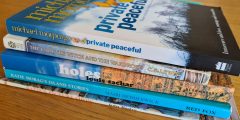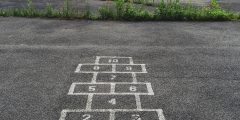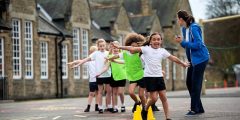Crafting mathematical learning journeys for children: the power of board work
May 2, 2025
Many primary school lessons – mathematics lessons included – include use of a PowerPoint, Google slides (or similar) presentation. Popular schemes of work provide slide decks (e.g. NCETM PD materials, White Rose, and Oak National Academy), and also include all of the resources, worked examples, explanations, and pupil tasks needed for lessons. Teachers supplement the …
Enhancing the writing process with technology: practical insights for teachers
March 27, 2025
Initial reflection on the relationship between technology and the development of writing might have you thinking they are not natural soul mates. However, schools across Transform Trust have been integrating technology into the writing process and this offers a dynamic way to engage students, supporting each stage from idea generation to final publication. Trust Associate …
Getting them out there: the importance of fieldwork in Geography and getting students in the zone to notice
June 13, 2024
In this post, Alex Booth and Mal Kerr make the case for the importance of fieldwork in geography and offer some guiding principles. “Geography wants to take children outside the school and into the streets and fields; it wants to take the keyboard tappers out of their gloomy offices and into the rain or sunshine.” …
My science teacher is telling tales
November 20, 2023
In this post, Jane Morris, from the University of Cumbria considers the potential contribution of a storytelling approach to science teaching. Doris Stickley’s thoughtful book “Water Bugs and Dragonflies” tells the story of a small colony of water bugs living happily below the surface of a quiet pond. Every so often one of them climbs up …
Making History Count in the Primary Classroom: digging deeper into Ofsted’s primary history review.
July 22, 2022
Over the last year, Ofsted has published research reviews into a range of different subjects, designed to collate the most current and most helpful research. In the second of our University of Nottingham Primary Education Network meetings for 2022, Victoria Crooks led a session with a group of school leaders and tutors from the Primary …
Supporting learners with dyscalculia and maths difficulties in the primary classroom
June 22, 2022
In this blog, Natalie Kerslake from Windmill LEAD Academy in Nottingham explores how she first became interested in supporting children with dyscalculia and maths difficulties, before discussing how they can be supported in the primary classroom. I recently had the pleasure of visiting the University of Nottingham, to deliver sessions to the Primary PGCE and …
Have we dropped the ball? Promoting PE in the primary curriculum.
May 22, 2022
In this blog, Esther Fulton reflects on the place of PE in the primary curriculum and suggests how its status might be raised. PE expectations As the Teachers’ Standards state, teachers need to have a secure knowledge of curriculum areas and manage classes effectively both in classrooms and around the school. PE is one of …
The Power of an Immersive Curriculum
April 20, 2022
In this post, Thomas Dransfield, Class Teacher and Key Stage Leader at Bramcote Hills Primary School in Nottingham shares some examples of creating immersive environments across the curriculum. Our SPARK Curriculum In recent years, the curriculum has taken precedence amongst educational stakeholders, and rightly so, for it is the quality of a school’s curriculum which …
Under the Microscope: a closer look at Ofsted’s science research review
March 9, 2022
Over the last year, Ofsted has published research reviews into a range of different subjects, designed to collate the most current and most helpful research. In the first of our University of Nottingham Primary Education Network meetings for 2022, our colleague Jo Hancock led a session with a group of school leaders and tutors from …
Harnessing the power of story to promote mathematical learning
December 16, 2021
In this blog post, which was originally published on the 27th Nov, 2020 on ‘Ponderings on maths education’, Catherine Gripton and Helen J Williams explore how to harness the power of story to support mathematical learning. How might picture and story books enhance the mathematical experience we offer young children? All children are entitled to …










